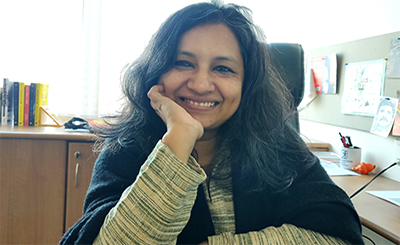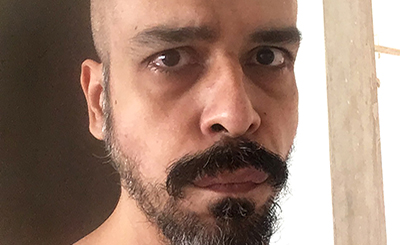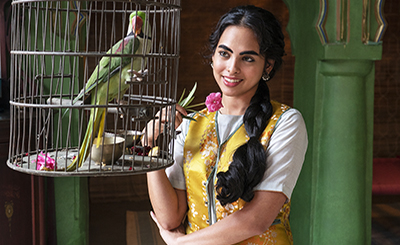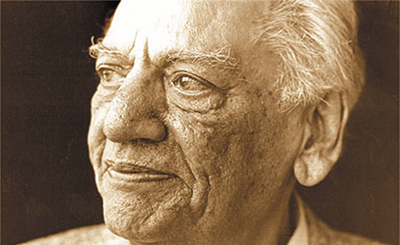
‘Look on the bright side. At least you didn’t know your baby.’ ‘Don’t worry, you can still have another.’ Those are common refrains. Everyone who comes to see us after Roma is discharged from the hospital mouths them. I listen, without uttering a word. Roma is far less generous. ‘I don’t want another baby,’ she tells a woman, ‘I want this one.’ ‘How dare you say I didn’t know him?’ she says to a man. ‘I carried him in my stomach for seventeen weeks.’
The wobble that enters her voice reveals a fragility I haven’t encountered in all the time I’ve known her. We met fifteen years ago in law school. Then she was a spirited Mumbai girl, who didn’t think twice about living alone in a tough city like Delhi to pursue her dream of becoming a Supreme Court lawyer. She stayed back to work in Delhi after law school. Four years ago, she joined the law firm for which I work. We began dating while working on a case. We’ve been married for the last three years. I’ve never seen her look so defeated. I know her as someone who gives as good as she gets. Now it appears as if the fight has been knocked out of her.
She spends hours gazing at the ultrasound pictures of our son. They no longer make her cry. She simply lays them all out in front of her and studies each one as if she is trying to find his soul. Otherwise, she lies in bed and stares at nothing in particular. Without the baby she looks impossibly small. I can sense the grief crashing about inside her. I try comforting her. That is the best I can. I can only do so much.
I thought I was lucky in life. My parents were in good health. As an only child, I had their undivided love. My career as a lawyer went as planned. I got married when I wanted, at thirty-eight, to a girl I loved. The years of married life were happy. Now it seems that all the blessings have been cancelled. I struggle to make sense of the emptiness enclosing me like a prison cell. In my world, punishment is meted out for breaking laws. Which divine law did Roma or I break to deserve this?
Mummy suggests we observe the death rituals. Out of respect for our unborn son. Maybe she believes that will help with the grieving. But there is no body to cremate or ashes to immerse in the Ganga. In the end, we settle on a prayer meeting. The entire ceremony bears the futility of a token act. Does death have a more pitiless incarnation? In one stroke, it obliterated the future Roma and I planned in such loving detail while leaving us nothing to salvage of the life we created, not even the memory of saying a proper goodbye.
Mummy comes to stay with us for a while. ‘Right now you can’t take care of yourselves,’ she says, ‘let alone each other.’
I was afraid the disappointment over losing their grandchild would turn Mummy and Daddy against Roma. It took them a long time to accept her. They found her insistence that I move out of my parents’ house and get my own place after marriage impossible to comprehend. ‘You are our only child. How can we live separately from you?’ they demanded. Their acceptance had less to do with approval than a reluctant recognition of the fact that I was going to marry Roma anyway. Even after the wedding, their relations with Roma remained frosty. The thaw only set in after I told them that she was pregnant; the news transformed her into a favourite daughter-in-law overnight. After the miscarriage, I was apprehensive that she might change into the unwanted daughter-in-law who had failed to deliver a grandchild. But I underestimated how close Mummy and Daddy got to her during her pregnancy. Far from heaping blame on her, they are happy to do anything they can to help.
As I walk through our apartment, I remember the joy exploding inside me when Roma announced she was pregnant, the arguments we had over our son’s name, the hours we spent gazing at the ultrasound pictures and wondering who he might take after. Life goes by in slow time. Not so long ago it would whiz by, filled with court appearances, meetings and planning for the baby. I barely notice when light becomes dark or dark light again. Sleep is as hard to find as the desire to climb out of bed in the morning. Eating is a chore. Meeting people an imposition.
Roma’s parents come to see her from Mumbai. Their visit does nothing to pull Roma out of her depression. A frown imposes itself on her forehead. An ashen pallor clings to her skin. She eats little and speaks even less. When she does talk, she blames herself for the miscarriage. She continued working at the same pace right through her pregnancy. She thought she’d slow down in later months. Now she wishes she had stopped working the instant she learnt she was pregnant. Then she wasn’t able to quit the occasional cigarette. I try telling her she is nowhere to blame. Mummy and Daddy back me up. The family doctor echoes the same sentiment. But nothing anyone says makes the slightest difference. She has convinced herself.
Mummy suggests I get her some help. Mummy, who belongs to a generation that grew up believing only mad people go in for counselling. ‘None of us know what she is going through,’ she says. ‘Not even her mother and me. We have no idea of what it is like to lose a child. You’d better get her to talk to someone who does.’
Mala is a stout elderly Bengali woman with short, steely-grey hair. A part-time professor of sociology at JNU, she teaches in the mornings, keeping her afternoons free for the women she counsels. I meet her in a cafe at the university. We sit across a rickety table with wobbly legs and sip sweet chai out of paper cups. She listens patiently as I explain the situation.
‘There is nothing lonelier than a miscarriage,’ she tells me. ‘It takes two to make a child, yet no husband can share in the intensity of the loss. They haven’t carried the baby. They haven’t felt it move inside them. They haven’t had the morning sickness. They may have seen it growing in ultrasound pictures, but they haven’t felt it grow inside them. They haven’t looked forward to breastfeeding it, or playing with it, or dressing it up the way its mother has. To have all that snatched away from you in the wink of an eye! There can’t be a worse feeling.’
My lips pucker. I’ve been far too immersed in my own grieving to realize how much tougher this is for Roma. ‘Can you help?’ I ask her.
‘I’ll come see her tomorrow. Don’t tell her who I am. In my experience, women are far more willing to open up if they don’t know I’m there to counsel them.’
She indicates she’ll come by tea-time. I decide not to tell Roma. Roma is refusing to see anyone, even old friends. If she knows Mala is coming, she might retreat to her room and ask to be left alone.
The next day, I introduce Mala as a professor from JNU who is known to my parents. Roma doesn’t say anything. I can sense her curiosity in the way her eyes never leave Mala. She is wondering why she’s here. Mummy goes to tell the maid to prepare tea. The three of us settle in overstuffed chairs in the drawing room.
‘I heard about your baby,’ Mala says to Roma. ‘I also lost my first baby thirty years ago. For days I couldn’t accept that she was gone. I pretended she wasn’t dead, that she was still inside me. I didn’t return any of the toys I had got for her or the baby clothes I had bought. All around me I had people telling me I should forget about her and move on, have another baby. But I couldn’t let go.’
Roma is swallowing and glancing in my direction.
‘Can you leave us,’ Mala says.
I go out, leaving the door slightly open so that I can listen from the other side.
‘You can talk to me. I know exactly what you’re going through,’ Mala is saying.
The ensuing pause lingers interminably before Roma says, ‘I feel so empty. I felt empty when I walked out of that hospital, an empty womb and a pair of empty arms. I thought I would feel better once I came back home. I don’t. Everywhere I look I see emptiness. I can’t bear to look at a pregnant woman or one with a baby in her arms. It’s got so bad that I’ve practically stopped going out.’
A hand settles on my arm. Mummy has come back from the kitchen. Gently, she leads me away.
Roma begins seeing Mala regularly. At first, Mala visits her at home. After a month, Roma is willing to go meet her at the university. By now I’m back at work. When I can I drive her to those meetings. On other days, Mummy and Daddy take her. We leave her alone with Mala and then pick her up at the appointed time. She never tells anyone what she is telling Mala. None of us asks. We can see the sessions are helping her. She is less withdrawn. Sometimes she becomes the old Roma in the car home, going on about Delhi’s stifling air and unruly traffic the way only someone who is not from Delhi can.
At Mala’s suggestion, we plant a peepal tree in our son’s memory. Since we don’t have a garden, we do it in a park close to home. We go back there at regular intervals to inspect the patch and speak with the gardener. On some days we spread a sheet on the grass next to the patch and simply sit there holding each other. In those moments the rest of the park vanishes. The traffic snarling on the road outside fades. The birds grow silent. It is as if the world has whittled down to the two of us and the peepal tree growing in the earth’s womb.
Slowly, Roma emerges from her depression. She goes back to work. She takes interest in her home. One night we have sex. We are lying in bed and talking, when I reach over and run my fingers through her hair. Since our son’s death, I have touched her only to comfort. That night I let my fingers wander. She turns to me, an eyebrow raised, a smile breaking all over her face. She looks exactly the way she looked when I indicated I wanted to make love in the past. Back then, I read that expression as an invitation to proceed. Tonight, I wait until a sigh rises out of her. After we’ve both come, I lie on my back, listening to her breathe as she sleeps beside me. I have no wish to go to sleep; I can stay awake all night, nestling in the gladness enveloping me.
In that moment, it feels as if nothing has changed.
We haven’t spoken about another baby. Mala advised me against rushing into something like that. Roma had just emerged from the trauma of losing our first child; it was best to wait until she was ready. I agreed with her then. Now I find myself thinking about another child. I don’t understand what happened any better than right after the miscarriage, but I’ve quit wondering about it. All you can do about death is learn to live with its injustice; I’ve accepted as much. Yet the emptiness my son’s death opened up inside me remains unaddressed.
It no longer swallows me as it did in the days following his death, but it is very much there. Only another child can begin to fill it up. Mummy and Daddy keep telling me how much they want to see their grandchild before it is too late. They are getting on. Roma and I aren’t exactly spring chickens either. I’m forty-two and Roma is two months shy of her thirty-ninth birthday. How long can everyone afford to wait?
That night the thought doesn’t let me sleep. Finally, I leave a sleeping Roma and make my way as quietly as possible to the cupboard to withdraw a big brown envelope from one of the shelves. I carry it to the drawing room, where I switch on the light and settle in the sofa. From inside the envelope, I pull out the ultrasound pictures of my dead son. I gaze at them, recalling the joy they had given us, before putting them down with a sigh.
‘Mukesh,’ it is Roma’s voice.
I scramble to hide the pictures in the envelope. Until now, I’ve only looked at them when Roma is not at home. I’m too late. Roma is standing in front of me in her blue nightgown.
She extends her hand. Reluctantly, I reveal the envelope. Her jaw trembles as she recognizes it. I rise to put my arms round her. Holding her close, I whisper, ‘Come on, let’s go to bed.’ She doesn’t answer, but allows me to lead her to the bedroom where she climbs slowly into the covers. I lie down beside her, wishing I had left the envelope in the cupboard.
‘I want to try again,’ she says.
I’ve been wanting to hear that for some time now. But the way it’s come out makes me feel as if I’ve forced it out of her.
‘You don’t have to,’ I tell her.
‘I want to. If I have to do it, then I must do it now.’
She turns over on to her side. I gaze at the back of her blue nightgown. I’m still uneasy.
She stops taking any new cases and offloads any work she can to her subordinates; she plans to stop working as soon as possible after getting pregnant. She was never religious. Now she visits a temple at least once a week. She organizes pujas. She fasts. She gives generously to beggars and observes all kinds of rituals. With complete dedication, she follows the dictates of her gynaecologist. She takes her medication religiously, does her exercises, and never misses an appointment. She reads anything she can lay her hands on about getting pregnant and managing a pregnancy. Am I doing everything right? Can I do more? She bombards her gynaecologist with such questions.
But she fails to get pregnant. Her distress deepens with each period. I suggest we change doctors. Things are no different with the new gynaecologist. Thinking maybe the problem lies with me, I get myself tested to be told my sperm count is fine.
Finally, I speak to Roma’s doctor. She says that Roma is so desperate to have a baby that she is stressing herself out, which is coming in the way of her getting pregnant. I come home and speak to Roma about it. I have Mala talk to her as well. Roma listens to both of us and agrees with everything we have to say about why she needs to be more relaxed. But she remains just as stressed out as before. I take her to a psychologist. The man tells her to come see him once a week and prescribes tablets to calm her. Neither the visits nor the medication make any difference.
By now the situation has begun to tell on me. I catch a grimace on my face each time I look in a mirror. A tight knot never seems to leave my stomach. In the past I’d wake up feeling hopeful, even excited. Now I emerge from sleep with the resigned air of a man who has got used to being disappointed. I can sense Mummy and Daddy’s disappointment each time I meet them. The expectant eyes that greet my arrival dim once they realise I have nothing to tell them. Their apparent dismay only serves to deepen my own.
Roma and I are barely talking. For a long time, all we talked about was the baby that would not happen. Now our disappointment has arrived at a pitch where it drowns out our voices altogether. The way we were before seems light years away. Our easy jesting conversation, our ready camaraderie, our frequent laughter… Everything that made our relationship the envy of friends and relatives seems to belong to another life. Now we can’t even discuss work, since I’ve moved to another law firm.
We can go through entire days without speaking to each other. By the time I wake up, she is already up and about. While I get ready for work, she busies herself with the servants. I inform one of the maids when I’m leaving. Sometime during the work day, I send her a text asking if everything is fine. She replies with a monosyllabic yes. By the time I get home in the evening, she has already eaten and retreated to the bedroom. I have my dinner alone in front of the television. Before I know it, I’m watching TV late into the night. I go to bed hoping she’s already fast asleep. That way I won’t have to lie there and feel bad about not wanting to make love to her.
It is a day that begins with the robotic banality that has come to mark all our days. We’ve barely exchanged a word by the time I leave for work. When I reach my office, my secretary reminds me of my meeting with Pia — a young lawyer from Mumbai who is going to work with us on a case. The meeting is in half an hour. I answer emails, until she informs me that Pia has arrived.
Pia oozes confidence from every inch of her willowy frame. Her movements are unhurried, her gaze steady, her speech assured. She isn’t wearing any make-up, not even a trace of lipstick. Yet her parchment-coloured face commands attention. Her full lips and brown eyes and slender nose and shoulder-length black hair imprint themselves on my mind within seconds. I note the way the edges of her eyes crinkle when she smiles, the way she leans forward when she’s listening, the way she taps the table with her fingertip once she’s finished speaking. I inhale her theatre of expressions and gestures as effortlessly as the air in the room. When I return to my office, my thoughts circle back to her to paint a portrait that grows more elaborate with each return.
When I catch sight of her slim figure, clad in a dark business suit, a tingle races through my body. I haven’t felt this way in a long time, and it troubles me to harbour such feelings for a woman other than Roma. In the evening, the two of us go down in the same crammed elevator and she’s squeezed against me in the crush of bodies. As her firm buttocks press into my penis, I feel myself grow hard. Whether the girl notices my erection, I do not know. She says goodbye in the same pleasant manner in which she said hello in the morning. I remain disturbed right through the drive home. When I get home, it is past dinnertime. I sit still in the car, unable to make myself go up.
It is a while before I can get out of the car and make my way up to our apartment. I enter the apartment to find the lights on only in the lobby and the dining room. Roma has gone to bed. Dinner is laid out on the table. I’m not hungry. I put down my briefcase and go to the bedroom. The air-conditioner is on and cool air is blowing across the room. I switch on the light furthest from the bed. Then I step over to the bed to find Roma lying on her back.
Her dark hair, with its newfound strands of grey, is spread on the white pillow. Her green nightgown rises and falls, as her breath eases out of her in a soft rattle. Its gentle rhythm tells me she is fast asleep. The lines on her face have softened and there is no frown on her forehead. She looks closer to the woman I fell in love with than at any time I can remember since the miscarriage.
Tears fill my eyes. This is the first time I’ve looked at her, really looked at her, for as long as I can remember. I take off my shoes. Without bothering to change out of my clothes, I switch off the light and lie down beside her. Closing my eyes, I listen to her breathing. Its gentleness suggests she has arrived at a place that is far from her troubles. If I listen to her long enough, maybe I, too, can follow her there.
More from The Byword
Comments
*Comments will be moderated
Kept me hooked to the story till the end. Great writing!
Ritika Bali
May 18, 2021 at 07:52











